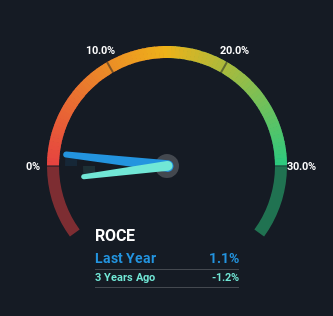- Hong Kong
- /
- Hospitality
- /
- SEHK:45
Hongkong and Shanghai Hotels (HKG:45) Could Be At Risk Of Shrinking As A Company
When we're researching a company, it's sometimes hard to find the warning signs, but there are some financial metrics that can help spot trouble early. Typically, we'll see the trend of both return on capital employed (ROCE) declining and this usually coincides with a decreasing amount of capital employed. This reveals that the company isn't compounding shareholder wealth because returns are falling and its net asset base is shrinking. So after we looked into Hongkong and Shanghai Hotels (HKG:45), the trends above didn't look too great.
Understanding Return On Capital Employed (ROCE)
For those who don't know, ROCE is a measure of a company's yearly pre-tax profit (its return), relative to the capital employed in the business. Analysts use this formula to calculate it for Hongkong and Shanghai Hotels:
Return on Capital Employed = Earnings Before Interest and Tax (EBIT) ÷ (Total Assets - Current Liabilities)
0.011 = HK$578m ÷ (HK$58b - HK$4.7b) (Based on the trailing twelve months to December 2023).
Therefore, Hongkong and Shanghai Hotels has an ROCE of 1.1%. Ultimately, that's a low return and it under-performs the Hospitality industry average of 6.1%.
Check out our latest analysis for Hongkong and Shanghai Hotels

Historical performance is a great place to start when researching a stock so above you can see the gauge for Hongkong and Shanghai Hotels' ROCE against it's prior returns. If you're interested in investigating Hongkong and Shanghai Hotels' past further, check out this free graph covering Hongkong and Shanghai Hotels' past earnings, revenue and cash flow.
So How Is Hongkong and Shanghai Hotels' ROCE Trending?
There is reason to be cautious about Hongkong and Shanghai Hotels, given the returns are trending downwards. To be more specific, the ROCE was 2.2% five years ago, but since then it has dropped noticeably. Meanwhile, capital employed in the business has stayed roughly the flat over the period. Since returns are falling and the business has the same amount of assets employed, this can suggest it's a mature business that hasn't had much growth in the last five years. If these trends continue, we wouldn't expect Hongkong and Shanghai Hotels to turn into a multi-bagger.
What We Can Learn From Hongkong and Shanghai Hotels' ROCE
In the end, the trend of lower returns on the same amount of capital isn't typically an indication that we're looking at a growth stock. Investors haven't taken kindly to these developments, since the stock has declined 43% from where it was five years ago. That being the case, unless the underlying trends revert to a more positive trajectory, we'd consider looking elsewhere.
One final note, you should learn about the 3 warning signs we've spotted with Hongkong and Shanghai Hotels (including 2 which don't sit too well with us) .
For those who like to invest in solid companies, check out this free list of companies with solid balance sheets and high returns on equity.
Valuation is complex, but we're here to simplify it.
Discover if Hongkong and Shanghai Hotels might be undervalued or overvalued with our detailed analysis, featuring fair value estimates, potential risks, dividends, insider trades, and its financial condition.
Access Free AnalysisHave feedback on this article? Concerned about the content? Get in touch with us directly. Alternatively, email editorial-team (at) simplywallst.com.
This article by Simply Wall St is general in nature. We provide commentary based on historical data and analyst forecasts only using an unbiased methodology and our articles are not intended to be financial advice. It does not constitute a recommendation to buy or sell any stock, and does not take account of your objectives, or your financial situation. We aim to bring you long-term focused analysis driven by fundamental data. Note that our analysis may not factor in the latest price-sensitive company announcements or qualitative material. Simply Wall St has no position in any stocks mentioned.
About SEHK:45
Hongkong and Shanghai Hotels
An investment holding company, owns, develops, and manages hotels, and commercial and residential properties in China, rest of Asia, the United States, and Europe.
Slightly overvalued with imperfect balance sheet.
Similar Companies
Market Insights
Community Narratives



